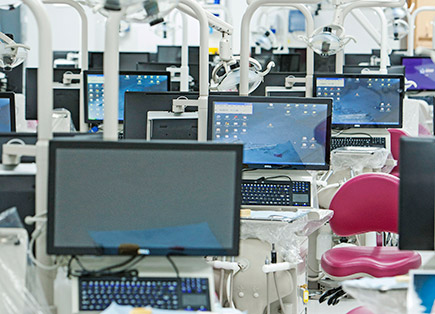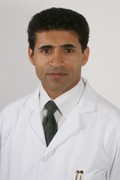Study options
- Starting in
- September 2025
- Location
- Whitechapel
- Fees
- Home: £19,400
Overseas: £63,250
EU/EEA/Swiss students
The course fee is charged per annum for 3 years. Note that fees may be subject to an increase on an annual basis - see details on our tuition fees page.
What you'll study
This DClinDent degree integrates academic activities with clinical practice. Covering all the topics in the GDC (UK) Specialist Curriculum, it aims to familiarise you with up-to-date, novel and evidence-based clinical practices in orthodontics.
Our curriculum covers a wide spectrum of topics. You’ll touch upon key orthodontic principles such as the biomechanical principles of tooth movement and the development, growth and influence of the skeletal and soft tissues on the dentition. You’ll also learn how to formulate a diagnosis of malocclusion and an appropriate treatment plan.
You’ll apply your learning in hands-on clinical training with children and adolescents and undertake a research project with supervision from our expert clinicians and academics. You’ll hone in on key techniques and practises, such as treating a variety of malocclusions.
You will receive professional doctorate-level research training and undertake your own. You will develop an understanding of the importance of materials science in orthodontics and gain critical appraisal skills in relation to published literature.
The DClinDent Degree meets level 8 of the Framework for Higher Education Qualifications (FHEQ).
Structure
- Three compulsory modules
- Three compulsory research modules, including your final dissertation (up to 50,000 words)
- Optional external Membership in Orthodontics (MOrth) examination, with the Royal College of Surgeons
Compulsory/Core modules
This module covers the basic biological science topics, operative and clinical skills to ensure that all students gain the fundamental level of skills and knowledge, which will then be used to build on, over the following two years of clinical training in Orthodontics.
This module covers aspects of research methodology, ethics and other transferable skills to ensure students are introduced to issues in research, such as governance issues and statistical analysis of clinical research. The research project undertaken in this course will give the student a real insight into the philosophy of research as well as practical experience in the process of completing a piece of original work. It also covers evidence based dentistry for the students to maintain their clinical portfolio.
This core module will consolidate the basic knowledge acquired in previous modules and introduce students to the more indepth understanding of the knowledge and clinical principles required to manage a range of maloclusions. This module also enhances the student's ability to mange the patient, in terms of their diagnosis and formulation of an appropriate treatment plan. This module will cover aspects of advanced knowledge and advanced clinical skills that form part of specialist training in orthodontics.
This module builds on the knowledge acquired in module Research I to enable students to carry out an independent research project and to write a report on their research, and to conduct a service evaluation through the completion of a clinical service audit. This module develops the skills and experience required for module Research III.
This module covers all aspects of Orthodontics to a specialist level including genetics, abnormalities in growth and development and advanced clinical skills. It will cover integrated knowledge obtained from the previous two years and its application to clinical practice. This module will also cover aspects of orthodontic care in relation to other dental and medical specialties and provide clinical training in the basic Multi-disciplinary approach to a range of malocclusion.
This final module in the programme enables students to demonstrate their ability to complete an independent research project and to write a thesis on their research, and the acquisition of advanced skills for service evaluation through the completion of a clinical service audit.
Assessment
- Written, clinical and viva voce examinations, case presentations, clinical diagnostic and treatment planning
- An oral assessment of your research report
In completing your third year, you will be eligible for the Royal College of Surgeons Membership examination (MOrth).
Dissertation
The dissertation forms a major component of your degree. This will include a final research project, service evaluation and a clinical portfolio (limited to 50,000 words).
—"The orthodontics program at Queen Mary University of London offers an exceptional blend of academic rigor and clinical experience. The curriculum is cutting-edge, and the faculty are experts in their field, providing invaluable guidance throughout. The hands-on training, combined with a strong focus on research and innovation, has truly deepened my understanding of orthodontics. I feel well-prepared to excel in my career thanks to the comprehensive and supportive learning environment Queen Mary provides."
Sohaim Alajmi, DClinDent Orthodontics
Teaching
The three-year full-time DClinDent Degree programme has a strong emphasis on close chair-side support. You’ll be taught through a variety of methods, including lectures, seminars, tutorials and symposia. You’ll also prepare a professional development portfolio based on evidence gathered over the course.
For every hour spent in class, you will be expected to complete further hours of independent study. Your individual study time could be spent preparing for, or following up on, formal study sessions, reading, producing written work, completing projects and revising for examinations.
You will be assigned an Academic Adviser who will guide you in both academic and pastoral matters throughout your time at Queen Mary.
Where you'll learn
Facilities
New postgraduate study and research facilities are available in the state of the art Blizard building, as well as the Institute of Dentistry, and include:
- 11 dedicated seminar rooms and a student learning centre
- 92 production laboratory spaces
- Digital imaging and two cutting-edge cone beam CT machines
- A PC in every operatory with ‘slave screen’ on chair for viewing images and discussing results with patient
- Modern facial-scanning equipment
- Facilities and services for 72 ‘phantom’ heads
Campus
Your postgraduate learning experience is enhanced by our fantastic location in Whitechapel, in east London.
The Institute of Dentistry moved to new premises in The Royal London Hospital in 2014 – the first UK dental school to be built in 40 years. The £78m new premises house the most modern dental facilities in the UK, following more than a decade of planning and work. The new premises provide cutting-edge technology, superb education and research facilities for clinical dentistry and a vastly improved patient experience.
Your postgraduate learning experience is enhanced by our fantastic location in the east of London, offering students many exciting opportunities to develop an understanding of health and the treatment of disease in a diverse local community, in a global and international context.

About the Institute
Institute of Dentistry
If you study with us, you will join a dynamic, successful dental school with a first-class reputation: Queen Mary has consistently been ranked in the top 20 in the World for dentistry in the QS World University Rankings by Subject and we were ranked joint first in the country for research environment for dentistry in the most recent national assessment (REF 2021).
The Institute of Dentistry is a special place to undertake your postgraduate studies. We bring together a number of world-leading researchers in basic and clinical sciences who supervise research students in the fields of oral medicine, oral pathology, oral microbiology, oral epidemiology, oncology, dental biomaterials, dental biophysics, dental public health, dental education, periodontology, orthodontics, paediatric, prosthetic and conservative dentistry.
The Institute is based in Whitechapel and offers cutting-edge technology, a superb education and first-class research facilities.
The Institute of Dentistry is part of Queen Mary’s Faculty of Medicine and Dentistry. Queen Mary is part of the University of London and a member of the Russell Group.
Career paths
The degree provides a sound basis for developing an academic career and for preparing for a career as a specialist in the discipline of Orthodontics.
As a graduate of this recognised GDC (UK) training programme, you will be able to sit exam to gain membership of the Royal College of Surgeons. This career path will enable you to register as a specialist in Othodontics.
- 100% of Dentistry postgraduate-taught students are in employment or further study (2020/21)
- 100% of Dentistry postgraduate-taught students are in highly skilled work or graduate study (2020/21)
Fees and funding
Full-time study
September 2025 | 3 years
- Home: £19,400
- Overseas: £63,250
EU/EEA/Swiss students
Queen Mary alumni can get a £1000, 10% or 20% discount on their fees depending on the programme of study. Find out more about the Alumni Loyalty Award
Funding
There are a number of ways you can fund your postgraduate degree.
- Scholarships and bursaries
- Postgraduate loans (UK students)
- Country-specific scholarships for international students
Our Advice and Counselling service offers specialist support on financial issues, which you can access as soon as you apply for a place at Queen Mary. Before you apply, you can access our funding guides and advice on managing your money:
Entry requirements
UK
Degree requirements
Applicants must have a primary qualification in Dentistry (BDS or equivalent).
Additional information
Two years full-time (or equivalent) post qualification clinical practice of dentistry, including six months full-time experience in oral & maxillo-facial surgery, paediatric dentistry or restorative dentistry is also required.
Please note that in order for your application to be considered you must have obtained a minimum IELTS score of 7.0 at the point of submission of your application.
Following the application deadline, screening of applications and selection of candidates will take place. Candidates who are shortlisted will be invited to attend an online interview with the Course Director.
Applicants from UK or EU
Obtaining the National Training Number (NTN) is required for UK/EU applicants with settled UK status prior to applying for the DClinDent Orthodontics Programme. Therefore, in addition to the application to Queen Mary University of London for this programme, a separate application is also required for submission directly to the Health Education England to obtain the National Training Number (NTN). You can find further information on how to apply for the NTN number online.
Find out more about how to apply for our postgraduate taught courses.
International
English language requirements
The English language requirements for our programmes are indicated by English bands, and therefore the specific test and score acceptable is based on the band assigned to the academic department within which your chosen course of study is administered. Note that for some academic departments there are programmes with non-standard English language requirements.
The English Language requirements for entry to postgraduate taught and research programmes in the Institute of Dentistry fall within either English band 4 or English band 5. This programme requires the following English band:
Band 4: IELTS (Academic) minimum score 6.5 overall with 6.0 in each of Writing, Listening, Reading and Speaking
We accept a range of English tests and qualifications categorised in our English bands for you to demonstrate your level of English Language proficiency. See all accepted English tests that we deem equivalent to these IELTS scores.
Visas and immigration
Find out how to apply for a student visa.

